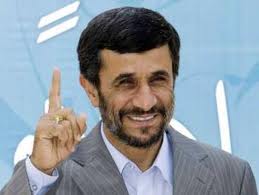Today U.S. hiker/hostage Sarah Shourd left Iran on a chartered plane for Oman. She had spent more than a year in an Iranian prison, much of it effectively in solitary confinement. There are several reasons for her release:
- She is ill. She has a lump in her breast and precancerous cervical cells. Iran is prepared to warehouse hostages almost indefinitely, but it never wants a hostage to become seriously ill or die in custody. When one of the original American hostages 30 years ago was diagnosed with multiple sclerosis, Iran unceremoniously sent him home. All charges of spying were simply ignored.
- Ahmadinejad is coming to New York for his annual media circus at the UN General Assembly. He usually pulls off some stunt just before he arrives, thereby giving himself a blaze of media attention and perhaps arming him with a talking point about Iran’s “humane” behavior. That is useful in responding to questions and charges that are sure to arise in the back-to-back “exclusive” interviews that his staff has been arranging for the past several months with every possible media outlet in New York.
But things don’t always work as planned. Ahmadinejad planned the release as a great photo op at the presidential palace in which he would bask in his own magnanimity as hundreds of flash bulbs popped. But the judiciary squelched that, claiming that the judicial process had not been properly followed, i.e. the evidence had not been presented to a judge and no court had ruled on the case. Two days later, the judiciary (run by one of Ahmadinejad’s rivals) announced that she would be released, but on a different day, without publicity, not at the presidential palace, and upon payment of bail – really a ransom – of half a million dollars. Of course, the evidence still has not been presented to a judge and no court has made a ruling. But the president was put in his place.
In the past year, Ahmadinejad’s behavior has succeeded in offending almost everyone in the conservative Iranian hierarchy, including Supreme Leader Ayatollah Khamene`i. Several months ago Khamene`i ordered him to remove Esfandiar Rahim Mashaie, a great favorite of Ahmadinejad and his son’s father-in-law, from a position as first vice president. Ahmadinejad complied after a cheeky delay and a coldly impersonal reply, but then immediately made Mashaie his chief of staff, his envoy to the Middle East, and seventeen other posts.
This extraordinary disdain for the supposedly infallible and all-powerful Supreme Leader has spawned endless speculation. It is widely suspected that Ahmadinejad is preparing the way for Mashaie to succeed him as president after his current term expires in 2013. (Iranian presidents are limited by law to two consecutive four-year terms.)
Hard core ideologues who profess to believe that Khamene`i is the chosen representative of God on earth grumble that Ahmadinejad’s behavior casts doubt on his loyalty both to the leader and to the doctrine itself. The doctrine – a theological version of the divine right of kings – is crucial since it is a useful way to justify the arbitrary rule, political repression, general economic incompetence, and lack of respect for the will of the Iranian people that are becoming the dominant characteristics of this Iranian regime, particularly after the contested 2009 election.
But Khamene`i has only limited maneuvering room in the contest with his irrepressible, supremely ambitious, publicity-hungry, populist-minded, and politically eccentric president. After the election, Khamene`i declared that God had spoken and had anointed Ahmadinejad the winner by a huge margin. Only one year later, it is difficult to admit publicly that the president may be pursuing policies that are inimical to the very foundations of the theocracy itself. Many believe that if Khamene`i had not linked himself so firmly to Ahmadinejad, the majles (parliament) would impeach him.
However, Ahmadinejad continues to perform very useful functions for the regime. He has cleansed the Iranian nezam (political structure) of reformist or technocratic holdovers and has replaced them with loyal, if often incompetent, veterans of the Revolutionary Guards. He is engaged in a possibly quixotic assault on the dysfunctional system of economic subsidies that suffocates the Iranian budget – a valuable but enormously unpopular undertaking. He has raised the taxes of the powerful merchant class known as the bazaar, which none of his predecessors dared to do.
Iran has had bitter internal disputes ever since the revolution. What is different this time is that it has gone public. The release of Sarah Shourd, as welcome as it is, is only a symptom of a much larger process: the attempt by Ahmadinejad to make the presidency into an indispensable and ultimately independent policy-making center. In that contest, he has allied himself with the Revolutionary Guards, arguably the real power behind the sanctified throne in Iran, rather than the Supreme Leader.
This is not good news for the United States in its on-again off-again efforts to engage with Iran. Ahmadinejad has given some evidence of wanting to forge an opening to the United States, as have presidents before him. But Ahmadinejad, like his predecessors, is hostage to a hostile internal environment that fears a deal with America could interfere with the cozy military-industrial-political consortium involving not only the Supreme Leader but also his protectors and economic beneficiaries in the Revolutionary Guards.
Other Iranian presidents have been confounded in their efforts to pursue an independent and more liberal foreign policy. Ahmadinejad experienced this with his ill-fated effort to negotiate a deal over nuclear fuel for the Tehran Research Reactor. And his efforts to orchestrate the release of Sarah Shourd were similarly thwarted. All politics is local – certainly in Iran but no less in the Iran-allergic political climate in the United States.
Ahmadinejad’s effort to build an independent power base is an audacious strategy by a mercurial and unpredictable politician. Everything he does while in New York should be viewed as part of that ultimate gamble.
